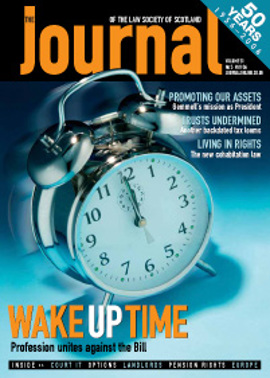Making IT happen

For the court solicitor with an interest in IT, these are exciting times. As such a solicitor, it was fascinating to attend the “21st Century Court Practitioners’ Forum”, held earlier this year at Edinburgh Sheriff Court. The idea behind the Forum, to quote one of its parents, Sian Warren of Simpson and Marwick, is “to facilitate a collaborative environment [that it is hoped] will influence the uptake in use and application of all matters electronic in the courts and justice system”.
Attendees heard a number of presentations and saw practical demonstrations of mature and developing court IT systems, from digital document management to sophisticated crime scene reconstruction software. What struck the writer, as someone with more than a passing interest in the subject matter, was how powerful and evolved some of the bespoke systems are. Just as important are the hardware resources available now throughout our court infrastructure, typically used for the presentation of evidence stored in digital format, e.g. DVDs or digital photographs. It was noteworthy also how hidden from general view are some of the public officials who have a huge support function to offer to the court solicitor.
Knowledge and practice
There are clearly a host of projects within our jurisdiction where exciting things are happening (for example ARTL and its cutting-edge promotion of digital signatures), but the fact that the organisers had conceived of the idea for a Forum to drive forward progress in this area flagged the very real concern that development in this area is too critical to be left to chance. The worry is that those in charge of big projects such as ARTL are not necessarily aware of other groups’ technical advances and vice versa. It is to be hoped that the Forum becomes established as a resource to share knowledge and promulgate best practice. In the short term, a website is planned to allow easy access by all interested parties – this could usefully host an online forum.
If the experience of the English IT and the Courts Committee (ITAC) is valid, the Forum should be a powerful catalyst for discussion and change. Interestingly ITAC intends to set up a similar public-facing website to promote the discussion of ideas south of the border.
For those solicitors and practices that use IT to any extent, be this simple word processing or automated case management, it is easy to be complacent in regarding oneself as progressive. A glance at the large numbers of firms still without an effective web presence shows, however, that nationally some catching up is required by the profession. It was hinted at the Forum that technology was a difficult issue for the solicitor; that we were disinterested or even intimidated by the subject. If that is correct, then surely this must change.
In the writer’s view, a simple website and email links to each of a firm’s fee-earners are now minimum business requirements for a modern profession, whether a firm is based in Lerwick, Stranraer, or anywhere in between. What is so exciting are the very real opportunities that the Forum could provide to the profession, if actively supported, to educate, consolidate, and ultimately power forward dynamic change in the way we work. In the first place, this need not be a giant leap to the type of e-filing system to be deployed in Austria, but rather a number of smaller steps towards an end result that could have our jurisdiction recognised as truly progressive.
Simple steps
The inaugural Forum meeting showed that currently available in the public and private sectors are the components for an advanced IT infrastructure. A little co-ordination could put these in the hands of the average firm. There are a number of things that can be done now at minimal expense and at different levels to drive efficiency into our court processes and move our legal system towards competing with the showpiece jurisdictions of the world:
- On an individual level, solicitors need to take an interest in IT. Insist on your own email address and use it. The fact that email is the future can now hardly be doubted. Those in need of encouragement might wish to note the recent debate in the House of Lords during the passage of the Company Law Reform Bill – arguably the consensus defined email and faxes as de facto business letters.
- Firms need to bring IT to the top of their agenda. A website is a must, as much for marketing as for any other purpose. The enlightened will already have realised that this is quite simply a requirement for their very survival.
- Our courts need to open up and communicate with their users. Online rolls are a useful resource, but in our capacity as the professional users of the courts, we surely deserve more. At a basic level, the clerks and administrative staff ought to be contactable on direct email, with addresses perhaps found on a secure site only accessible to legal practitioners.
- The Scottish Court Service needs to make the facilities it already offers more widely known. At present a link to its Electronic Service Delivery Unit (“ESDU”) and the comprehensive assistance offered by the ESDU to court solicitors in appropriate cases is hidden away on the webpage www.scotcourts.gov.uk/resources/courtroomtech/courtroomtech.asp?dir=home.
- In major cases, ESDU assistance with the provision of hardware for the display of scanned productions has been proven to reduce significantly the court time required to conclude a lengthy proof or trial. For everyday litigation, all courtrooms now have access to hardware that allows playback from a variety of media sources – tape, CD, DVD etc.
- E-filing (the direct filing of court documents by email) has to be our aspiration. As an interim measure, why not allow practitioners the ability to file steps of process with scanned signatures via fax or email? Whether these are printed off by the court and stored as hard copies, or kept in electronic form, it would be a step towards the fully electronic process folder that appears to be a reality in other jurisdictions.
- We should not be afraid to push the innovative solution. Webcams are cheap to buy and broadband video messaging thrives. What is to prevent the technology-savvy Stornoway solicitor from “appearing” via a weblink at his motion in chambers in Perth Sheriff Court, without ever setting foot on the mainland?!
- Finally, a personal plea to those in charge of the administration of the writer’s local courts: the Court of Session and Edinburgh Sheriff Court – could we have a wireless internet network installed for the use of solicitors? Such an easy (and cheap) thing to implement but one that would bring huge benefits to agents who could stay in touch with the office, and the wider online world, during what would otherwise be downtime.
Push for the front
For our colleagues in England, there is a worry that they are so far behind the international pace that digital development is now of critical strategic importance to the profession. Indeed, commentators have expressed concern that the City will start to haemorrhage commercial litigation to the more progressive Singaporean and New York jurisdictions. To the writer’s knowledge, England’s e-filing project, beyond their automated small claims process, is suffering serious setbacks.
Digital signatures are very much the Holy Grail for e-filing, and it is striking that our own Registers of Scotland have led the way in this area. They will shortly issue smartcards to conveyancing practitioners as part of the ARTL project to allow for the “signing” of digital deeds. In this move, Scotland’s property solicitors will come head to head with other EU countries such as Austria and Spain, which have issued smartcards with digital signatures to all lawyers.
It is surely but a small step from this to Scottish Court Service building on the Registers of Scotland’s groundwork, to allow for a general rollout of the technology to all interested solicitors. The jigsaw pieces have been laid before us. Is it not time to put away our quaint notarial stamps and embrace the revolution? Just think of the kudos the Scottish legal profession would derive from a move to leapfrog the English and challenge the most technology-focused jurisdictions. Imagine pulling business back home and seizing new work as clients start to appreciate the benefits of our digitally-enabled courts, with positive changes to their choice of law and exclusive jurisdiction clauses. For this is very much a client-driven process.
The clients’ choice
Many firms with medium and larger sized corporate clients will have an awareness of the level of IT sophistication that is the norm in other service industries. For example, many insurance companies routinely hold fully digital files. If there is a choice, what sort of litigation process will such a client prefer? Something that remotely mirrors their industry’s average practice, or the age-old confusion of paper, lost productions, and tedious pace that can be the current experience?
Surely our small jurisdiction has a real chance to punch above its weight through the development of cutting-edge IT practices. To do this, a centralised task force would be needed to develop the goal and coordinate our move towards it. Maybe the Scottish Executive’s recently announced Civil Justice Review (to be published later this summer) can be taken as an opportunity to identify IT as an issue on which to focus. For the meantime, perhaps the Court Technology Forum can drive forward the debate on how to transform the practice of court law into a fully 21st century experience.
Mark Harrison, e-LITIGATE Solicitors, Mark.Harrison@e-litigate.com, www.e-litigate.com
In this issue
- Stand up to be counted
- A bill to divide us
- The pendulum swings
- The pendulum swings (1)
- Cohabitation: the new legal landscape
- The tax man cometh (again)
- The foreign legion
- Making IT happen
- Apportioning and sharing
- Property problems
- Still a profession
- Arguing over agreements
- Next generation law
- Lawyers in the transfer market
- Scottish Solicitors' Discipline Tribunal
- Landlords: setting the mark
- Website review
- Book reviews
- Purchase options in leases






